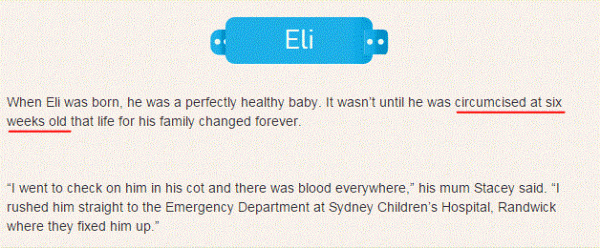 Brian Morris is a former Professor of molecular biology at the University of Sydney. He has spent much of his adult life attempting to defend the practice of routine infant circumcision. He has, in essence, fought a personal war against a normal part of the human anatomy (the male foreskin). Morris has utilised a wide range of tactics in order to prosecute his case in relation to this issue. He has mastered the art of optimising media opportunities to promulgate his views on the subject. He has also surrounded himself with like-minded individuals, whom he has hoped would provide credible support for his war against the foreskin. Morris and his allies have attempted to harness scientific research in order to underpin their opinions and they have been unrelenting in their attempts at discrediting those who express views that contradict their own. Despite his dedication and persistence, the evidence provided below demonstrates quite clearly that Morris has lost the battle. The ‘courts’ of science, medicine and (perhaps most importantly) public opinion have ruled against him.
Brian Morris is a former Professor of molecular biology at the University of Sydney. He has spent much of his adult life attempting to defend the practice of routine infant circumcision. He has, in essence, fought a personal war against a normal part of the human anatomy (the male foreskin). Morris has utilised a wide range of tactics in order to prosecute his case in relation to this issue. He has mastered the art of optimising media opportunities to promulgate his views on the subject. He has also surrounded himself with like-minded individuals, whom he has hoped would provide credible support for his war against the foreskin. Morris and his allies have attempted to harness scientific research in order to underpin their opinions and they have been unrelenting in their attempts at discrediting those who express views that contradict their own. Despite his dedication and persistence, the evidence provided below demonstrates quite clearly that Morris has lost the battle. The ‘courts’ of science, medicine and (perhaps most importantly) public opinion have ruled against him.
Public visibility has been a major weapon in Brian Morris’ war against the foreskin. He has used his ‘status’ as a professor with great efficiency in this regard. Every notable story/article about circumcision that has appeared in the mainstream Australian media over the last few years has featured Morris. His recent television appearances include segments on the Nine Network’s ’60 Minutes’, the Seven Network’s ‘Sunday Night’ and SBS’s ‘Insight’. In addition, to the best knowledge of this author, Morris has also been quoted in every mainstream Australian print media article on the subject of circumcision in recent times. Morris has benefited from the fact that all mainstream media outlets attempt to set up a ‘polemic’ debate about seemingly controversial issues. It might, therefore, appear to some that Morris’ media war against the foreskin has been a success but public responses to his input tell a different story. In every relevant forum, the overwhelming majority of commentators have been scathing of him and his position. It is therefore obvious that Morris’ mainstream media war against the foreskin has been a dismal failure. He has lost.
Morris has also been very proactive in using internet weaponry in his war against the foreskin. In the first instance he created a website called ‘CircInfo.net’. That site is still active and contains nothing other than pro-circumcision propaganda. Until recently, ‘CircInfo’ contained an entire page devoted to tasteless ‘circumcision humour’, which included a photo of an underage boy with his penis trapped inside a mobile phone. There was clearly no educational value that image, which leads this author to question Morris’ motivation in posting it. ‘CircInfo’ was originally hosted on University of Sydney servers but, after a complaint from a member of the public about a conflict of interest, Morris was ordered by his employer to move it to another server.
Morris continues to use that site (and the internet in general) to try and discredit those who speak out against his war against the foreskin. ‘CircInfo’ has a whole page devoted to this endeavour. There are many misrepresentations and much misinformation offered on that page. When one assesses the character of some of Morris’ own associates (see below) it would appear to be quite hypocritical for him to attempt to discredit the entire anti-circumcision movement on the basis of ‘guilt by association’. Morris has even gone so far as to attempt to discredit the profession of paediatrics. He claims on his website that (quote) ‘most paediatricians are well-intentioned. However, clearly this specialty would attract male medical graduates with a sexual predilection for children’. Aside from the fact that such a comment reeks of a smear campaign, there seems to be something grossly incongruous about the fact that, on one hand, Morris has sought to denigrate paediatricians, whilst on the other hand, he has since put his name to a statement which congratulated the American Association of Pediatricians for issuing a statement which alleged that the health benefits of newborn male circumcision outweighed the risks. It is, therefore, apparent that Morris is a cynical opportunist of the highest order.
Another example of Morris’ ruthless attempts at discrediting those who oppose him occurred in 2004, when respected scientist Dr Karl Kruszelnicki published a short article titled ‘May the foreskin be with you’. Morris objected to Kruszelnicki’s highlighting of the fact that the foreskin is ‘a uniquely specialised, sensitive, functional organ of touch’ and accused him of promulgating ‘blatantly biased propaganda’. Morris’ hypocrisy in this instance was breath-taking, given the one-sided nature of his own web site. Morris lodged an official complaint with The Australian Press Council but it was dismissed in its entirety. Given all of the above, it is clear that Morris’ propaganda war against his opponents has been a dismal failure. He has lost.
Morris has fought his war against the foreskin under the banner of ‘an evidence based appraisal’. Clearly however, his use of scientific studies to support his argument in favour of circumcision has failed the credibility test in two hugely important regards. First, Morris has only ever referred to studies which purport to give credibility to his position (most of which are authored or co-authored by Morris himself). There is no impartiality or balance in Morris’ so-called ‘appraisal’. No acknowledgement is given to the massive amount of credible literature which calls Morris’ position into question. Furthermore, Morris has not met the professional standards required in order be regarded as an expert on the issue of circumcision.
Morris has regularly used ‘sleight of hand’ in order to fudge statistics and other information to suit his argument. To provide just one example, Morris once co-authored an article which claimed that a UK study had found that ‘cumulative prevalence (of UTI’s) to age 16 was 3.6% in uncircumcised boys’, however the article in question actually made no reference at all to the circumcision status of the boys included in its study. That document also claimed that circumcision ‘protects against recurrence’ of UTI’s. It cited an article in the Journal of the American Medical Association (JAMA) as supporting evidence for that claim, however the JAMA article in question stated quite clearly that ‘the lack of circumcision documentation in 47% of male children limited our ability to accurately assess risk based on this important factor’. These serious misrepresentations of supporting evidence clearly call into question the credibility of Morris and the other authors of the article referred to here.
Morris and his views on circumcision are clearly out of step with the majority of medical professionals in Australia. The Australasian Association of Paediatric Surgeons describes neonatal circumcision as ‘inappropriate and unnecessary’. Furthermore, in 2012, the results of a poll released online by the ‘Australian Doctor’ revealed that only 2% of those surveyed supported the view that infant circumcision should be mandatory. Conversely, 51% of respondents ‘likened the procedure to child abuse’. Morris must therefore most certainly be regarded as a ‘minority reporter’. One observer has even gone so far as to aptly label him ‘Professor 2%’. It is clear that Morris’ pseudo-scientific war against the foreskin has been a dismal failure. He has lost.
Morris has developed extensive networks with others who share his desire to fight a war against the foreskin. Clearly, his choices in this regard have often been less than ideal. Morris was previously closely associated with the UK based ‘Gilgal Society’. Until recently, the Gilgal Society was led by Vernon Quaintance. In 2012, Quaintance was found guilty of possessing child pornography (including images of males under the age of 16). In April 2013, Morris claimed on a Facebook page called ‘Yes, I’m Circumcised’ that he had ‘never met’ nor spoken to Quaintance however, curiously, he then went on to confirm that (quote) ‘Quaintance offered to assist in the production of professional quality brochures and that…(he)…accepted his offer’. Until shortly after Quaintance’s conviction those very brochures were available for download from Morris’ website and they carried the ‘Gilgal Society’ name and logo.
In 2010, Morris helped found an organisation known as the ‘Circumcision Foundation of Australia’. The President of CFA is Dr Terry Russell. Russell is the principal operator of ‘Circumcision Australia’, a small group of Doctors based in Brisbane and Melbourne who proudly claim that they have performed ‘over 30,500 circumcisions’ in the last 20 years. Russell himself has been performing circumcisions for more than 35 years. As such, Russell clearly has a significant financial vested interest in the promotion of circumcision. In 2004, Russell was reprimanded, ordered to repay $4,488.88 and to undergo counselling by the Professional Services Review (PSR), an independent Commonwealth body established to ‘protect the integrity of the Medicare and Pharmaceutical Benefits schemes’. The PSR found that Russell ‘opportunistically diagnosed tongue-tie’ in patients referred to him for circumcisions. It found that 90% of such procedures performed by him (for which a Medicare rebate was claimed) were ‘inappropriate’ on the grounds that there were ‘no clinical indications for the services’ rendered.
In addition, Morris has co-authored ‘peer reviewed’ papers with others who have no relevant formal academic qualifications, most notably Jake Waskett. In April this year, Morris confirmed via the ‘Yes, I’m Circumcised’ Facebook page that Waskett is ‘an IT expert’ who ‘did not complete his degree’. Morris attempted to validate his association with Waskett by suggesting that he ‘has an academic level knowledge of the medical literature on male circumcision’. Despite Morris’ protestations, it is clear that Waskett is neither a doctor nor a scientist. As such, he is in no way qualified to contribute to publications which claim to possess mainstream medical or scientific credibility.
Ultimately, social and ethical issues are decided in the court of public opinion. In the case of Morris’ war against the foreskin, the jury has spoken loudly and clearly. In Australia, routine infant circumcision rates have been in dramatic freefall since the 1970’s. At that time, around 85% of boys were subjected to the practice but that figure has now fallen to around 15%. The practice is banned as elective surgery in public hospitals in most jurisdictions. This situation is mirrored in all other Western democracies. Circumcision is now firmly entrenched as a minority practice in all of Europe, the United Kingdom, Canada and New Zealand. Even in the United States (where circumcision has traditionally been most firmly entrenched as a cultural norm) the tide is turning. Routine circumcision now impacts upon less than 50% of the neo-natal male population in America and that number continues to fall. These statistics provide clear evidence that Morris’ public relations war against the foreskin has been a dismal failure. He has lost.
On his own website, Morris makes the following observation: ‘Imagine holding a set position for years, a good portion of one’s life dedicated to that cause, only to find out the effort had little effect’. Ironically, that comment summarises Morris’ current position perfectly. He has fought a long, hard and sometimes dirty personal war against the human foreskin but, as the evidence provided above clearly shows, when judged against any relevant measure, Morris has lost the fight. It is, therefore, surely time for him to raise the white flag and officially surrender.
Footnote: A screenshot of Morris’ comments on the ‘Yes, I’m Circumcised’ Facebook page is available upon request. To obtain a copy, send us an email via the ‘Contact Us’ page on this site.
 Australian comedian Lawrence Mooney makes people laugh for a living but his performance at the 2016 Melbourne International Comedy Festival showed that he is clearly not in the slightest bit amused by the fact that he was routinely circumcised as an infant.
Australian comedian Lawrence Mooney makes people laugh for a living but his performance at the 2016 Melbourne International Comedy Festival showed that he is clearly not in the slightest bit amused by the fact that he was routinely circumcised as an infant.










